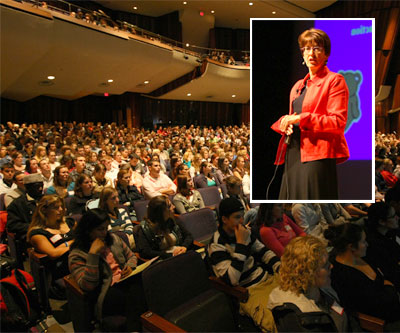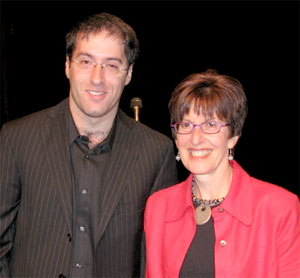 |
| Laine Cohen addresses a capacity crowd of students in their first year of a health professions program. (Nick Pearce Photos) |
The room belongs to her once-athletic, vibrant son. At the age of 17, Daniel Cohen was a passenger in a car that crashed and sent him through the windshield—he wasn’t wearing a seatbelt—and bouncing headfirst on the roadway. Having sustained a severe brain injury, all his dreams—to be a ski bum at Whistler, to return to the summer camp where he was a counselor—were swept away. He was in a coma for weeks, spent months in hospital and a year at a rehab centre.
But through the love of a mother, the determination of a father and the unwavering hope of a sister, Daniel and his family worked through their tragedy. Mrs. Cohen wrote a book, Crooked Smile, about the experience, documenting the accident’s affect on the entire family as they put their lives on hold to focus on bringing Daniel back to life. The book is also a plea to the medical profession to take families seriously and to listen to their concerns and suggestions.
As Mrs. Cohen addressed the students—future occupational therapists, physiotherapists, counselors, social workers, nurses, doctors, dentists—she urged them to consider fully what “family-centred care” really means and why it is so important to patients and their families.
She says family members are desperate to assist; they can do occupational therapy exercises with the patient, for example, if shown how and they also have valid ideas for treatment and care that arise from their intimate knowledge of the patient. And sometimes rules need to bend: despite hospital rules excluding everyone but family members from visiting, Daniel needed his friends around him. He responded better to the camaraderie and companionship of his high school buddies than to the medical know-how of the experts.
She also urged health professionals to bear in mind how they share information. They have to be honest in their prognosis without taking away all avenues for hope. In their own family’s case, a meeting with a doctor after Daniel’s accident left them reeling and feeling devastated. “It was a time of absolutely no hope,” she relates.
 |
| Daniel and Lainie Cohen after the presentation to health professions students. (Anne Webster Photo) |
Mrs. Cohen’s compelling presentation ended with a powerful punch line: “Students of Dalhousie University, I’d like you to meet my son, Daniel Cohen.”
Wearing a black suit, a tall, dark-haired man shuffled onto the Rebecca Cohn stage as the students applauded and wiped away tears. That short walk epitomized the reason for the afternoon session: to stress the importance of family-centred collaborative care. It's an approach that actually works.
“What?” asks Daniel, surveying the audience and smiling a crooked smile. Now in his early 30s, Daniel is able to live independently. He does his own cooking, laundry and banking. And he’s back doing the sports he loves, including downhill skiing and water skiing.
“If I put on a helmet, nothing can stop me.”
LINK: Crooked Smile
From Crooked Smile (ECW Press): In chapter one of Crooked Smile, Lainie Cohen writes about the moment she first sees her son in hospital. At 4:45 a.m. Joel, Alyssa, and I are finally allowed into the surgical intensive care unit to see Daniel. As we walk down the hall, Joel pulls ahead, his stride like that of a speed walker approaching the end of a race, determined and fatigued. Alyssa and I clasp hands. We pass white-curtained windows before we approach his bed. I can see the steady rise and fall of his chest under the crisp sheet. My heart races. My son is alive! His eyes are closed and his face looks so still. Cheeks and chin, darkened with shadow, are almost hidden behind the pale blue tube that snakes from his mouth to the ventilator on the wall, controlling his breathing. His head is wrapped in white gauze bandages covered by a blue cap; the indigo corona pierced by a thin wire poking out above his left eyebrow. My gaze follows the wire to a machine that flashes with bright shiny lines and buzzes in a language I don’t understand. Joel and I are stricken dumb as we stand by our son’s side. But Alyssa reaches out and touches him gently on his right arm that rests “Daniel, we’re here now. You’re fine. Everything is going to be fine.” My voice croaks as my throat tries to squeeze out words: “Daniel, we love you.” All Joel can manage is, “Daniel.” Our legs are rubbery when we turn to leave. We walk as if our feet were bound together, Joel in the middle, his arms weighted on our shoulders. Somehow we make our way back to the car. Alyssa drives home. |
